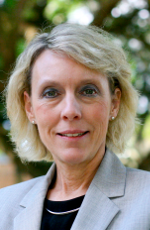What started as a hunch for Dr. Teri Chenot about a year and a half ago has turned into a multi-level, community and nationwide gap-filling awareness movement for transitional youth and adults with Attention Deficit Hyperactivity Disorder (ADHD).
She addresses the issue as October is ADHD Awareness Month.
After years of research in the areas of patient safety, quality and health outcomes including the children’s health population with ADHD, Dr. Chenot, an Associate Professor in the School of Nursing of the Brooks Rehabilitation College of Healthcare Sciences, realized she saw no community model in the United States to address students with ADHD once they left home and entered college.
“There is a large gap to be addressed,’’ she said. “These transitional students have been left in a free fall. When they get to college they lose the family structure.’’
Many times, the loss of structure gives the idea that the ADHD symptoms have disappeared and results of that notion can include students, for a variety of reasons ranging from athletic requirements to peer pressure, not being compliant with their medication regime which can promote negative outcomes.
“Once away from the family structure it becomes a challenge for students to maintain the multi-modal treatment aspect for ADHD,’’ she said.
Armed with her information, Chenot has been proactive in both internal (campus wide) and external communication. On campus presentations to faculty have been well received and a community initiative, which she co-chairs with Dr. Jeffrey Goldhagen, has sprung to life.
The initiative, ADHD Community Professionals Committee (ADHDCPC) is in collaboration with the Partnership for Child Health, and Dr. Chenot co-chairs with pediatrician and a professor in the Department of Pediatrics at the University of Florida College of Medicine – Jacksonville, Dr. Jeffrey Goldhagen.
The committee has some of the key community health experts in our area including Dr. Kristin Alberts, Director of the Student Counseling Center, and is tasked to review current services in the community for the emerging adult with ADHD and to identify any possible gaps in services for that population so there is improvement in learning and health outcomes to promote their successful life transition.
Discussion with faculty has been wide ranging including symptoms exhibited by those with ADHD.
“Faculty has been surprised by many things during the on-campus presentations,’’ Chenot said. “For example, there is a possibility that students with ADHD will bend under peer pressure with negative outcomes. And, they have been surprised that something like dorm room design/study environment matters and that students can go to Student Life and discuss the possibility of special accommodations.’’

Other considerations also have been set in motion.
An inter-professional healthcare team that includes Chenot and Goldhagen has submitted a proposal for a three-year grant from the Florida Blue Foundation. The grant award recipients should be announced next month.
“If we get the grant the team will create an ADHD model to develop community education and develop an ADHD network to disseminate new knowledge throughout Florida,’’ she said.
Dr. Chenot’s work will put JU on an international stage Nov. 10 when she presents at the non-profit Children and Adults with Attention-Deficit/Hyperactivity Disorder (CHADD) 28th Annual International Conference in California. CHADD provides education, advocacy and support for individuals with ADHD.
Her topic is The Development of An Innovative Inter-professional Community Model for the College Student/Young Adult Population with ADHD to Improve Learning and Health Outcomes.
Her presentation will examine the development of an innovative inter-professional community model for the college student/young adult population with ADHD including the multi-modal comprehensive approach to improve learning and health outcomes. Strategies for success will be identified that includes continuity of care and collaboration among community stakeholders.
“The ADHD model and inter-professional healthcare team might be the first of its kind in the country,’’ Chenot said. “So, it is anticipated that Jacksonville will serve as an exemplar as a community model to improve the health outcomes and promote a successful life transition for this population.’’
– Jim Nasella
 Wave Magazine Online Jacksonville University News Hub
Wave Magazine Online Jacksonville University News Hub
